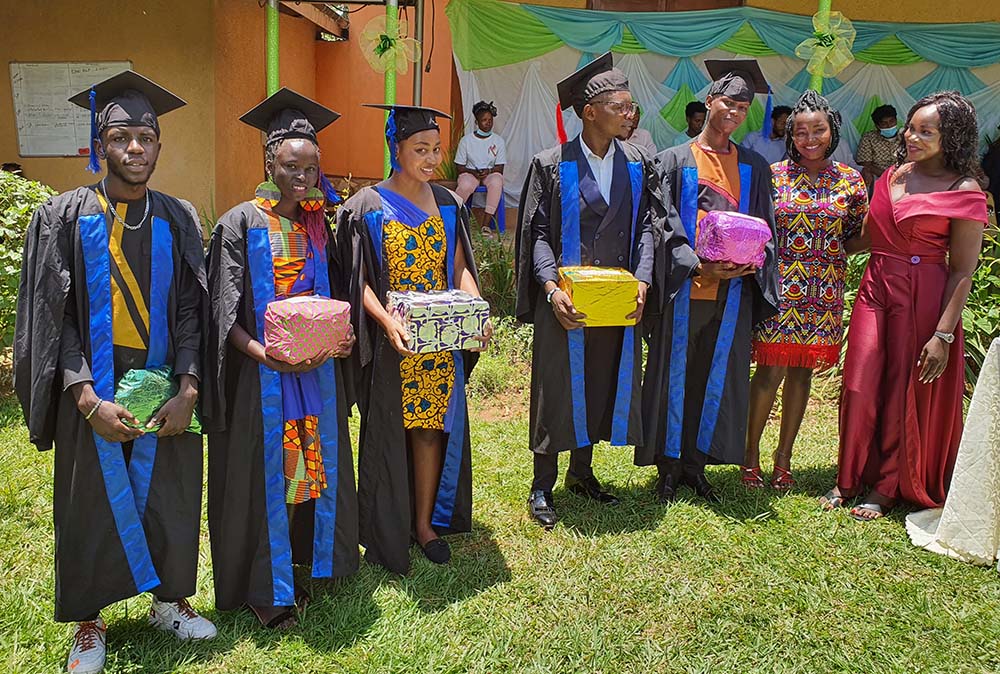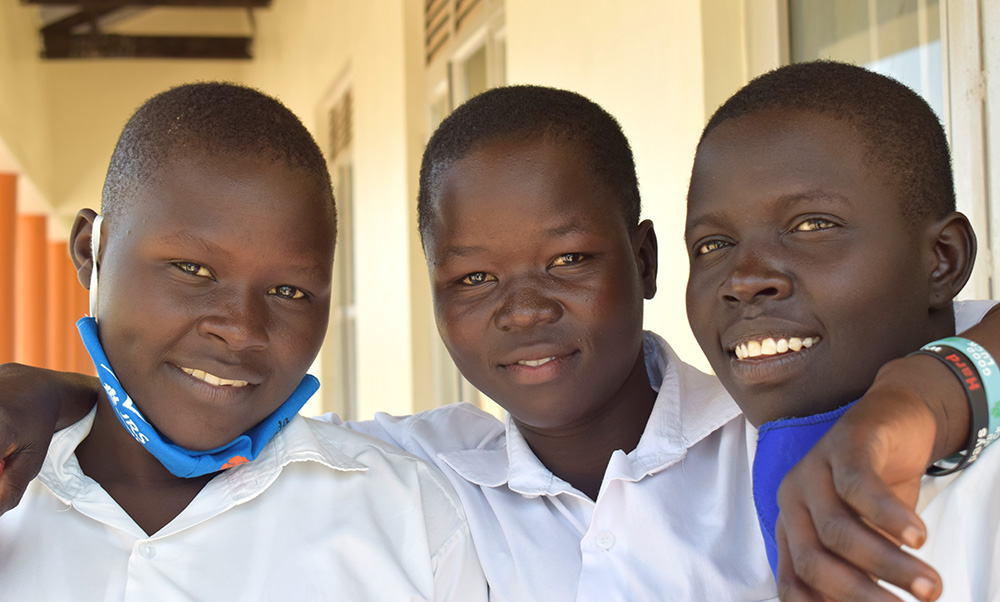
Tailoring students were awarded prizes by Jesuit Refugee Service on graduation day in Kampala, Uganda. (Courtesy of Jesuit Refugee Service)
I met the Jesuit Refugee Service (JRS) in the 1990s when I worked in Tanzania; it had established the Ngara refugee service at the boarder of Rwanda and Tanzania to serve the fleeing refugees from Rwanda. I'm impressed by the noble services JRS renders to the poor, needy and vulnerable.
As a consecrated person, I have passion and zeal about giving hope to the hopeless, with Jesus the Master and Servant Leader. "I have come that they may have life more abundantly" (John 10:10). "The spirit of the Lord is upon me, he has sent me to bring Good News to the poor" (Luke 4:18). With these ever in mind, whenever I see fellow consecrated persons serving in line with my motivation, I easily get hooked by them and want to amplify their work through print or electronic media.
Besides, Pope Francis' call to respond to the seven goals of "Laudato Si', on Care for Our Common Home" and the Laudato Si' Action Platform further challenge us. Goal No. 2 is about heeding the cry of the poor. Perhaps this will encourage more response to the cry of the poor in refugee camps and settlements. Even more importantly, I hope the perpetrators and warmongers stop the negative thoughts and action that devastate the world.
Consecrated persons in Uganda have teamed up with JRS to advocate, listen and respond to the cry of the urban refugees in Kampala through education and child care. Every year, 70 children are offered day care to allow their parents to learn English or participate in a vocational skills training at JRS. The interventions in Kampala include education, emergency assistance, and livelihood and psychosocial support.
Sr. Hellen Tabea of the Missionary Congregation of the Evangelizing Sisters of Mary has served ten years as JRS education coordinator, assisted for six years by Sr. Esperance Mave-Bahati of the Sisters of Mary of Ingelmunster. Besides administrative work, they teach and offer psychosocial counseling and guidance to the students. The sisters also help in recruiting students.
Advertisement
"With our six- and 10-year experience, we have enjoyed several success stories," Tabea recounts.
Ali, a Somali refugee, was one. "Learning English was a huge challenge, but Ali was determined, and quickly learned how to express himself. He could write and read some words, while spending hours with notes and books. The long distance did not stop him from attending daily classes; his commitment was beyond compare. One day he told the class: 'When my country Somalia gets done with war, I will become an English translator to my president because back home, no one speaks English more than me!"
Ali socialized, learned skills of self-management, dreamed big and never kept his thoughts to himself. He made great strides after his education. During his graduation speech, he selflessly shared about his past life in the jungle with his parents — about the time when he didn't wear clothes!
"Studying English language at JRS has greatly improved my communication skills and changed my perspective about life and the world," he said.
After the course at JRS, Ali got a job in a supermarket, and with his first salary he bought some munchies for the JRS staff as a sign of gratitude. His ambition grew and he applied for a job with the Office of the Prime Minister as a Somali translator. He was shortlisted for the interview, where he excelled, and began a new life.
With his first salary, he immediately bought a new tricycle for hire during his free days and weekends. Many people hired him and quickly he bought a second tricycle, which he entrusted to a loyal driver. He has become a good service provider and a job creator for his fellow refugees!
One day, he surprised the JRS staff when he came to the office in a new car. He said, "I want to share my story with you again. Imagine this illiterate jungle man educated by JRS in Uganda! I have come to ask you to bless my new car."
Ali has decided to leave the job at the Office of the Prime Minister and become self-employed, using his vehicles as taxis.
To advance girls' inclusion and the overall quality of education in the region, JRS also has been increasing and improving secondary school infrastructure in the Adjumani district, Uganda. As part of this effort, a science laboratory was built at the secondary school in the Pagirinya refugee settlement, and the refugee girl students were blessed with a well-equipped laboratory to meet their school's scientific needs.

Some student beneficiaries of the new science laboratory that was built at the secondary school in the Pagirinya refugee settlement in Uganda (Courtesy of Jesuit Refugee Service)
A brochure quoted the team as saying that to access education, especially in science, barriers like the "lack of safe educational spaces and inadequate school infrastructure further exacerbate refugee girls' vulnerability to poverty, early and forced marriage, and pregnancy, as well as damaging socio-cultural attitudes and norms."
With a capacity of 80 seats, the laboratory will enhance the teaching of science subjects in the school.
The head of the science department, Icha Augustine, explained, "When you teach theoretically, it is hard for the students to grasp the lessons. Now we use the real apparatus and not just drawings and will allow students (including more than 250 girls) to get hands-on experience of science, technology, engineering and mathematics subjects. Before the lab construction, students could only engage in practical lessons over the weekend."
JRS Uganda also sponsors primary, secondary and tertiary/university education for young adults. English language is taught as the medium of communication for integration of refugees who hail from Congo, Burundi, Rwanda, South Sudan, Sudan, Eritrea, Somalia, Ethiopia and Central African Republic. The tertiary/livelihood department offers hands-on skills like fashion and design, hair dressing, arts and crafts, catering, basic and advanced computer skills for networking, maintenance and repair. There is also business and marketing, to open avenues for employment opportunities after internship.
The JRS team in Eastern Africa provides assistance to refugees and asylum seekers in camps and cities, as well as individuals displaced within their own countries. The most vulnerable among the refugees are supported by individual and group counseling. Teachers trained in psychosocial skills help handle stressed and stigmatized children. With a regional office in Nairobi, JRS Eastern Africa provides assistance to refugees and asylum seekers in camps/settlements and cities, as well as individuals displaced within their own countries in Ethiopia, Kenya, South Sudan and Uganda.
Since its inception in the 1980s, JRS has offered food, shelter and medical aid to vulnerable people displaced mainly due to war and famine. To date, its services are expanding in response to the needs of more refugees from ever increasing civil wars and inter-ethnic conflicts in South Sudan, Sudan, Somalia, Eritrea, Rwanda, Burundi and the Democratic Republic of Congo.
The escalated violence in South Sudan has resulted in a greater influx of refugees fleeing to neighboring countries, especially Uganda. This calls for increased cooperation to address issues of migration and vulnerability, and I know the sisters will be there!





